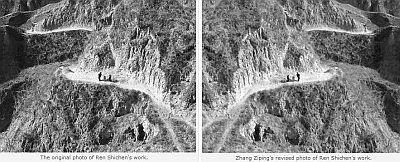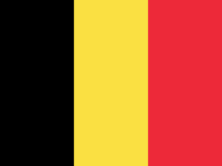
Compare for yourself: On the left, Ren Shichen's photo and on the right, Zhang Ziping's image, which won the Clean Water Alliance photo contest.(Credit: Prison Photography)
A Chinese man plagiarized and altered another man’s image to win a nature photo contest this month, Global Times reported July 20.
Zhang Ziping won first place in a Beijing Clean Water Alliance photo contest July 5, but the person who actually took the picture, Ren Shichen, saw and recognized his image as the prize winner.
The image is of a few people walking along a mountainous path. “Local villagers at that time had to fetch water from downhill because the well dried up,” Ren is quoted in the Global Times. “When I stood on the mountain road and looked down, I saw the villagers’ silhouettes and was inspired to take the picture.” Zhang’s image is a mirror version of Ren’s and appears to be lighter in areas.
Ren, a journalist, took the photo in 2007, The Global Times reported. He contacted the contest organizers, who took away Zhang’s award July 16.
Ren wants “50,000 yuan ($7,353) in compensation from Zhang,” the Global Times reported.
“The photos are my painstaking work and Zhang’s behavior has infringed on my copyright and right of honor. I feel offended,” he told the newspaper.
Zhang couldn’t prove that he had taken the photo, CriEnglish wrote July 19. “Zhang has reportedly taken part in many photography contests and won several prizes. However, several big names in the Chinese photography field say they have never heard the name before.”
James Gao of the Clean Water Alliance wrote in an e-mail to StinkyJournalism that this is the third photo contest held since 2005.
The nonprofit Clean Water Alliance holds the contest “to raise public awareness on the water environment issues.” There was no fee to enter the contest, and the alliance received more than 2,400 photos from 23 countries, Gao wrote.
Zhang’s first place recognition didn’t come with any reward. “After receiving report letter on the real photographer, we disqualified him,” Gao wrote.
The International Photo Contest guidelines instructed that “photos should be genuine without any re-design by computer technologies.”
iMediaEthics has written previously about Zhou Zhenglong, a Chinese farmer whose 2007 images of an endangered tiger in the wild grabbed national attention. The photos were used to promote tourism and Zhou was given a financial award until bloggers discovered similarities between Zhou’s photo and a poster image. Zhou was arrested and given a two-and-one-half-year sentence, which was later changed to a three-year reprieve. Zhou maintains the photo is real, but a three-year investigation by China’s state forestry administration reported there are no tigers in the county Zhou where claims he took his photograph.
iMediaEthics most recently wrote about Zhou May 8 when he was arrested for breaking the conditions of his reprieve. Zhou was searching for the tiger to redeem himself without authorization.
UPDATE: July 29,2010, 2:03 PM : Typo fixed and clarification made in last sentence.





Comments Terms and Conditions